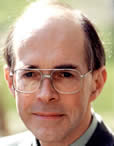Tag: 00 O’Donovan_Oliver
An Act of Judgment? (O’Donovan, 2011)
Why do the Christian ethics of war and the law founded on it prohibit assassinations? Because assassination cannot be a true act of judgment. The logic of armed conflict is a logic of collective judgment on collective responsibility for wrong. War enacts justice between nations, taking over judgment, as the old saying had it,ubi iudicia cessant,where the courts run out. Its justice is attributive, denying the facility to do wrong, rather than vindicative, setting right old wrongs. As judgment it is pretty rough, lacking the detailed discernment to attribute personal responsibility.
Certainty and Charity. Presentation to House of Bishops Advisory Group on Sexuality (O’Donovan, 2012)
Christians are used to appealing to heavy reasons for doing what they do; they think of themselves as always acting on their beliefs. Theology, with its own warning against making a graven idol, teaches us to travel light ideologically, to allow the non-ultimate claims of immediate practical need to have their own space.
Practical theology can understand the place of the “pastoral accommodation” within the church. A pastoral accommodation is a response to some urgent presenting needs, without ultimate dogmatic implications. A pastoral accommodation may be paradoxical in relation to basic moral belief, as with the miscalled “just war” which appears at first glance to undermine the commitment to peace which it claims to uphold. The Winchester Report, in recommending a provision for marriage in church of someone with a previous partner still living, conceived this as a pastoral accommodation, making it quite clear, as did the episcopal advice to clergy that followed it, that this was to uphold the principle that marriage was essentially a lifelong commitment and broken marriage was a wrong
Oliver O’Donovan in Conversation (O’Donovan, 2013)
The Gospel and Public Life: Cultivating a Faithful Witness in the Face of Challenge On October 8th, 2013, British moral philosopher Oliver O’Donovan visited America’s capital and participated in a dialogue with Ken Myers and Matthew Lee Anderson. Held a few blocks from the Capitol building, the conversation addressed questions and themes of political theology and was loosely centered around O’Donovan’s 1996 book The Desire of the Nations. The event was sponsored by RenewDC, Mere …
“Judge not” and “Judge for yourselves” (O’Donovan, 2013)
The presenting question about the category of judgment is its ambivalence: why is it an activity that we are sometimes warned against, sometimes encouraged to undertake? To begin with, we must make some
cursory observations on the scope of the term.


